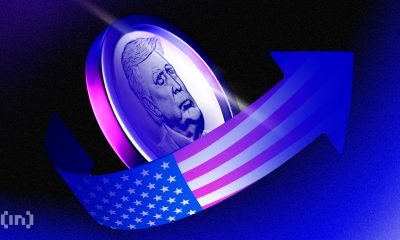Regulation
DOJ “Sweet Deal” for Binance Changpeng Zhao Faces Backlash

Changpeng Zhao, the former CEO of cryptocurrency exchange Binance, was recently sentenced, which led to a variety of reactions. Zhao, charged with noncompliance in the implementation of an adequate anti-money laundering program in Binance, was given four months in prison.
This is in spite of the fact that the Department of Justice (DOJ) did not charge him directly with money laundering but rather chose to focus on procedural lapses with the company he had founded.
The light sentence handed to one of the wealthiest people in the cryptocurrency sector has sparked public anger and conversations regarding the adequacy and equity of the DOJ’s technology industry white-collar crime approach. Having a net worth speculated to be more than $40 billion, the punishment of Zhao has led to an inquiry regarding whether financial penalties and short imprisonment sentences are enough deterrents for high-net-worth individuals.
Public and Expert Reactions
Zhao’s sentencing has received responses from the public as well as from various experts, but the response to the sentencing was mixed. While some consider the sentence justified by legal precedents and Jao’s post-indictment cooperation, others, like Dennis Kelleher, CEO of Better Markets, believe it is a serious injustice.
Kelleher’s strong criticism arises from his opinion that the DOJ’s approach to the case implies a rather permissive attitude towards the potential corporate offenders, especially in the fast-growing crypto industry.
Some legal analysts have mentioned that federal sentencing guidelines for similar nonviolent offenses usually advise no prison term for first-time offenders, which impacts the judge’s ruling. Nevertheless, the difference in sentences between Zhao and other prior high-profile cryptocurrency industry cases has furthered the discussion on the uniformity and severity of legal consequences for corporate offenses.
Changpeng Zhao’s Penalties and Corporate Compliance
Apart from the prison sentence, Zhao was also fined $50 million, which most critics say is peanuts considering his enormous wealth. This aspect of the sentencing also adds weight to the view that the monetary penalties are generally disproportionally low in respect of the personal wealth of high-net-worth individuals convicted of white-collar crimes.
In addition, under the pact, Binance is to appoint an independent monitor to supervise its adherence to anti-money laundering rules and practices for a period of up to five years.
This action is perceived as a step towards more regulatory control over cryptocurrency exchanges on the part of other countries, many of which have criticized these firms because they enable anonymous financial transactions.
Continued Business Operations and Oversight
Irrespective of the discussions that surrounded his sentencing, Zhao’s standing in the crypt world is relatively high. Binance remains operational and dominant in the cryptocurrency exchange market.
Zhao is also allowed to come back to a leadership position within several years, a condition which is met with the skepticism by critics who believe that it undermines the severity of accusations against him.
The independent monitor, as well as other charges that may be filed in the future against the other individuals involved with Binance’s operations, are considered vital means of determining the DOJ’s continuous commitment to holding the financial giants accountable.
Read Also: US DOJ Charges Bitcoin Pioneer Roger Ver with Tax Evasion
The presented content may include the personal opinion of the author and is subject to market condition. Do your market research before investing in cryptocurrencies. The author or the publication does not hold any responsibility for your personal financial loss.
Regulation
USDC Issuer Circle Set To File IPO In April, Here’s All

USDC issuer Circle is reportedly set to file its initial public offering (IPO) in April as part of the firm’s plans to finally go public. The stablecoin issuer is allegedly already working with top financial institutions to achieve this move.
Circle To File IPO In Late April
According to a Fortune report, Circle is looking to file its IPO in late April, although the listing period remains uncertain. The report noted that when a company files to go public, its shares usually begin trading four weeks later, indicating that the listing could occur in May. However, there is also a scenario where the IPO process could drag on for months.
The stablecoin issuer is reportedly working with investment banks JPMorgan Chase and Citi to achieve its long-anticipated IPO. The firm had previously tried to go public in 2021 under a SPAC arrangement with a shell company.
The US SEC failed to sign off on this arrangement back then, and the company eventually scrapped these IPO plans by the end of 2022 when the crypto exchange FTX collapsed and the broader crypto market experienced a downturn.
Revelation about Circle’s IPO plans comes just days after the stablecoin issuer partnered with NYSE’s parent company to explore USDC’s use in traditional finance (TradFi). Meanwhile, the USDC stablecoin recently launched in Japan following approval from the country’s regulator. Notably, USDC is the first and only global dollar stablecoin approved under Japan’s stablecoin framework.
An Easier Path Now For The Stablecoin Issuer
Circle will likely face less resistance for its IPO plans under the current SEC administration. Under acting Chair Mark Uyeda, the Commission has shown its willingness to work hand in hand with crypto firms, which was missing under Gary Gensler’s administration.
US SEC Chair nominee Paul Atkins has also shown his willingness to change the approach that Gensler’s administration adopted towards crypto firms. During his nomination hearing, the SEC Chair nominee promised to prioritize providing regulatory clarity for the industry.
Circle’s IPO listing would be the biggest since the top crypto exchange Coinbase went public in 2021. Interestingly, Coinbase owns an equity stake in the crypto firm.
The firm’s USDC is currently the second-largest stablecoin by market cap, only behind Tether’s USDT. The stablecoin industry is heating up as more financial institutions look to develop their own stablecoin.
Donald Trump’s World Liberty Financial recently revealed plans to launch its USD1 stablecoin, while asset manager Fidelity is also considering doing so.
Disclaimer: The presented content may include the personal opinion of the author and is subject to market condition. Do your market research before investing in cryptocurrencies. The author or the publication does not hold any responsibility for your personal financial loss.
Regulation
Japan Set To Classify Cryptocurrencies As Financial Products, Here’s All

Cryptocurrency investors in Japan are bracing for impact following a plan to reclassify digital assets as financial products. While the plan has elicited excitement from cryptocurrency enthusiasts in the Far East, the ambitious plan will have to scale several legislative hurdles.
Japan Targets Reclassification Of Cryptocurrencies As Financial Products
According to a report by Nikkei, Japan’s Financial Services Agency (FSA) is inching toward classifying cryptocurrencies as financial products. Per the report, the FSA intends to achieve the reclassification via an amendment to the Financial Instruments and Exchange Act.
Currently, digital assets in Japan are considered crypto assets conferred with property rights and seen as payment means. Under the FSA’s plans, cryptocurrencies in Japan will be treated as financial products in the same manner as traditional financial products.
The FSA says it will adopt a slow and steady approach toward the reclassification, carrying out “a private expert study group” to test the waters. If everything goes according to plan, the FSA will submit the amended bill to Parliament in early 2026.
The classification of cryptocurrencies as financial products will have far-reaching consequences for the local ecosystem. Experts say treating cryptocurrencies as financial products will bring Japan closer to a crypto ETF launch amid a changing regulatory landscape.
Furthermore, the move may lower current cryptocurrency taxation for local investors since existing capital market rules will apply to the asset class.
A Fresh Bill For Crypto Insider Trading Is Underway
Apart from the reclassification, the FSA disclosed plans for new legislation against insider trading. The move flows treating cryptocurrencies as financial products and will strengthen existing investor protection rules.
“It is a direction to establish a new insider trading regulation that prohibits trading based on unpublished internal information,” said the FSA. “We will develop laws to prevent unfair transactions.”
However, Japan’s cryptocurrency scene is heating up to a boil, driven by local and international players. Last week, stablecoin issuer Circle secured approval from the FSA for USDC with top exchanges set to list the stablecoin.
Japan’s Metaplanet has tapped Eric Trump to join its Strategic Board of Advisors as it continues to load up Bitcoin.
Disclaimer: The presented content may include the personal opinion of the author and is subject to market condition. Do your market research before investing in cryptocurrencies. The author or the publication does not hold any responsibility for your personal financial loss.
Regulation
Kentucky Governor Signs Off On ‘Bitcoin Rights’ Bill, Strengthening Crypto Protections


In what is being dubbed a major development in the crypto regulation space, the Governor of the US state of Kentucky, Andy Beshear, has signed the ‘Bitcoin Rights’ bill into law. The law promises to safeguard protections for Bitcoin (BTC) users.
Bitcoin Rights Bill Comes Into Effect
Crypto regulations continue to evolve under pro-crypto US President Donald Trump’s administration. In the latest development, Kentucky has become the newest state to enshrine protections for digital asset users.
In an X post published on March 24, crypto advocacy group Satoshi Action Fund announced that Governor Beshear had signed the much-anticipated Bitcoin Rights bill into law. The post stated:
The right to self-custody, run a node, and use of digital assets is now protected for millions of Americans without fear of discrimination.
The bill was first introduced to the Kentucky House by Rep. Adam Bowling on February 19. According to the bill’s description, it seeks to safeguard users’ rights to use digital assets and self-custody wallets. Additionally, it aims to prohibit local zoning changes that discriminate against crypto mining operations.
The legislation outlines guidelines for running a digital asset node and excludes digital asset mining from money transmitter license requirements. It also clarifies that crypto mining or staking is not considered an offer or sale of securities.
On February 28, the bill passed Kentucky’s House of Representatives with a unanimous vote of all 91 representatives in favor. It later passed the Kentucky Senate on March 13, receiving backing from all 37 senators.
Kentucky’s proactive stance toward cryptocurrencies isn’t new. Earlier this year, the state became the 16th US state to introduce legislation seeking to create a Bitcoin strategic reserve.
Meanwhile, neighboring state Arizona is also joining the crypto movement. A recent X post by Bitcoin Laws revealed that Arizona’s House Rules Committee has passed two Bitcoin reserve bills — SB1373 and SB1025. These bills will now head to a full floor vote.
Renewed Optimism Under Trump Administration
Following Trump’s victory in the November presidential election, cryptocurrency regulations in the US are evolving rapidly, with many states introducing legislation aimed at strengthening their digital asset ecosystems and attracting crypto businesses.
Positive changes in crypto regulations are encouraging industry businesses to expand. For instance, leading crypto trading platform Coinbase recently announced plans to hire 1,000 employees in the US.
The Trump administration has also witnessed several lawsuits being dropped against major crypto entities, including Kraken, Coinbase, Gemini, and others. At press time, Bitcoin trades at $87,399, down 0.2% in the past 24 hours.

Featured Image from Unsplash.com, chart from TradingView.com

Editorial Process for bitcoinist is centered on delivering thoroughly researched, accurate, and unbiased content. We uphold strict sourcing standards, and each page undergoes diligent review by our team of top technology experts and seasoned editors. This process ensures the integrity, relevance, and value of our content for our readers.
-

 Market24 hours ago
Market24 hours agoTop 3 Made in USA Coins to Watch This Week
-

 Market23 hours ago
Market23 hours agoSolana (SOL) Price Risks Dip Below $110 as Bears Gain Control
-

 Altcoin18 hours ago
Altcoin18 hours agoCardano Price Eyes Massive Pump In May Following Cyclical Patern From 2024
-

 Market14 hours ago
Market14 hours agoBitcoin Bears Tighten Grip—Where’s the Next Support?
-

 Market13 hours ago
Market13 hours agoEthereum Price Weakens—Can Bulls Prevent a Major Breakdown?






















✓ Share: